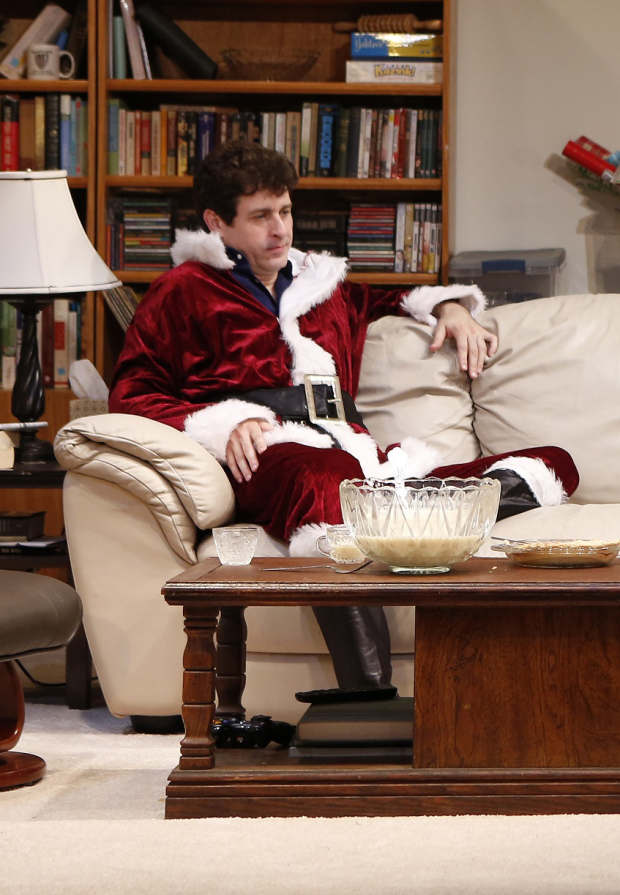Straight White Men
At the Kirk Douglas Theatre, Young Jean Lee spins a tale of suburban angst among the privileged.

(© Carol Rosegg)
A testosterone-laden Christmas gathering between a man and his three grown sons jumps the rails when one of the boys inexplicably breaks down weeping at the dinner table and can't – or won't – explain the cause. Is the guy simply having a bad night or is something festering so deeply within the rubric of American life that even a supposedly untouchable demographic of straight white men is not immune to its reach?
Playwright Young Jean Lee clearly believes it's the latter, and the canny production of her play Straight White Men sneaks up and slaps you in the face in its West Coast premiere at the Kirk Douglas Theatre. Masquerading as a frat-boy holiday romp, Lee's play, directed by the author, has much more on its mind than easy satire or sociological declaiming. And with Brian Slaten pacing a solid and always entertaining four-person cast, Lee delivers an early holiday dram of eggnog laced with arsenic.
Things have not changed much in the Norton household since patriarch Ed's sons left the nest a couple of decades ago. Within the family room (designed with a nice eye for casual suburbia by David Evans Morris), games and books occupy the same shelves since the kids were little; bulk canisters of snacks can be found in the same nook above the laundry. The offstage TV set, though we can't see it, is probably gigantic and hooked up to whatever video game console is most current. Yes, the boys are back and in their comfort zone.
Returning just for the holiday are youngest son Drew (played by Frank Boyd), a college professor and novelist and his older brother, Jake (Gary Wilmes), a successful banker with a broken marriage and two kids. Sibling bonds are strong in this household. Whether they're wrestling, breaking into song, reliving a memory or tormenting each other, Jake and Drew possess a real simpatico. Kindred spirits despite their different career paths, these two don't fight; they rumble.
Eldest son Matt (Slaten) is directionless and has moved back in and is marking time working for a temp agency until he figures things out. After the boys' mom died a few years ago, Matt took over and became a cook, errand boy, and housekeeper for his father Ed (Richard Riehle) cook. Slaten's drooping face and sorrowful eyes effectively make him the saddest Christmas Eve host in existence. Consequently, his breakdown comes as little surprise; his family's reaction to the outburst less so. It's not simply that these men can't cry, they simply believe men of privilege don't…or shouldn't.
Until Lee gets to the crux of her story, a large portion of "Straight White Men's" early scenes is spent on alpha-male antics (which gets repetitive) or exposition. Jake and Drew play a doctored Monopoly game titled Privilege. Jake, Drew, Matt, and Ed perform a rousing version of "OKKKlahoma!" the song Matt wrote in high school to protest the dearth of African Americans cast in the high school musical. We get that this family is most at home in its past, every memory preserved and re-created. And Wilmes and Boyd – who look nothing alike – nonetheless nail the sibling chemistry. Tearing each other apart or rapping to Run DMC, the actors certainly establish a credible brotherly bond.
Ed, the patriarch, is the play's least developed character, but Riehle does nice work as a middle-American, salt-of-the-earth man who is reacting to changes that he can't always understand. Lee emphasizes that Ed is basically a gentle guy, not the fount from which his sons' take-no-prisoners beliefs about success have sprung. All of this makes his climactic scene with Slaten's Matt that much more affecting. Under Lee's artful direction, that final scene is a surprise that is more than a little bit heartbreaking.
Slaten has given us enough of Matt's charisma to keep an audience firmly in the character's corner. We want Matt to make good perhaps as much as his family does. Ultimately, the character is our sociological mirror – whether we are straight, white, male, or none of the above – and the prospect of ending up as a loser for reasons that you can't explain or justify is enough to put a serious damper on any American's yuletide spirit.









